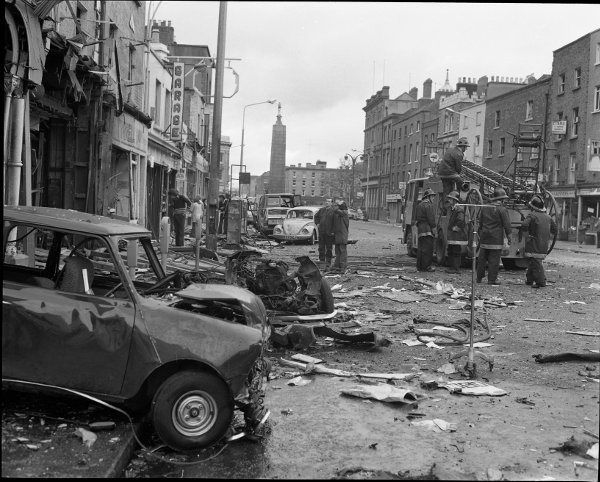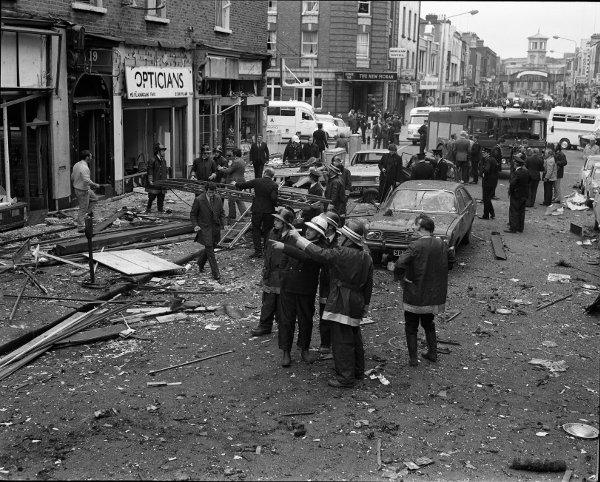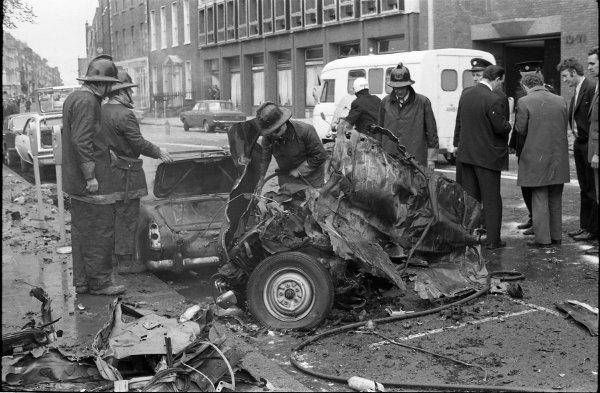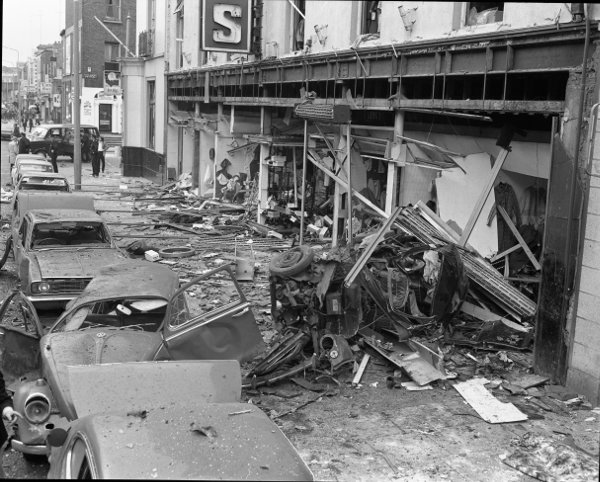BERNIE McNally was in the stock room when the first bomb went off.
Closing time was nearing at O’Neill’s shoe shop on Dublin’s Talbot Street. But a customer had come in at the last minute.
She asked Bernie if she would get her a pair of sandals quickly, as she was going away the next morning.
It was a beautiful Friday evening and all the 16-year-old shop assistant could think about was spending the weekend gallivanting with her friends as she made her way to the basement.
A loud bang echoed across the city from Parnell Street, half a mile away, and Bernie knew it was a bomb. But she had no comprehension of the damage it had caused and the lives it had obliterated.
A worried May McKenna stood in the hallway when she returned from the stock room.
“Did you hear a bomb just now?” the Tyrone woman asked nervously.
“I think so, yeah, it sounded like that,” Bernie replied.
The possibility of a bomb hitting Dublin was not unimaginable to the two women as they stood there in silence.
By May 17, 1974, the Troubles in the North had moved on from intermittent outbursts of violence to a bloody war. A police car would patrol the streets of Dublin every week, its megaphone blasting out instructions for what to do if ever a bomb warning had been received.
Bernie and her colleagues had discussed how and where they would hide in such a situation.
But Bernie never thought it would actually happen. And it never crossed her mind that a bomb in Dublin would change her life forever.
Breaking eye-contact with May, she took one step back into O’Neill’s still holding the shoes for her customer.
As she was half way through her second stride, a blinding flash lit up the sky. Swinging her head to look through the window, Bernie’s first thought was that it must have been a flash of lightning.
Then came a roaring boom and suddenly she was thrown to the ground. Still it hadn’t crossed her mind that a second bomb had gone off. She thought she must have been hit by the lightning.
A choking dust cloud filled the room. Shelves and shoes were crashing down on top of Bernie. The still vibrating ground was now covered with glass and rubble.
Stirring from her shock, Bernie pulled herself up onto all-fours.
“Oh Jesus, don’t tell me I’m blind,” she thought as she struggled to see through the smoke.
She knew her head was wounded and there was something wrong with her eye.
But she felt no pain.
All she could hear was somebody groaning, but she couldn’t see where they were.
“Groan louder,” Bernie yelled, shuffling to her left in case she was on top of the person making the haunting noises.
It was only when Bernie struggled to her feet and made her way outside that she realised what had happened.
No warning had been given before a bomb had gone off directly outside O’Neill’s so nobody had a chance to hide.
As the dust settled, the twisted wreckage of a car sat in the street as a symbol of war.
By then a third bomb had exploded and Bernie realised those groans she heard inside the decimated shop had probably come from someone who was dying.
She would later learn that both May McKenna and the shopper she was helping were wiped out in the blast.
They were two of the 27 people murdered in Dublin on that day, when three no-warning car bombs exploded between 5.28pm and 5.32pm, on Parnell Street, Talbot Street and South Leinster Street.
Among the victims were a pregnant woman, the full term baby she was carrying and a young family of four, who were walking to St Stephen’s Green to enjoy the evening.
Ninety minutes later, a fourth no-warning car bomb went off outside Greacen’s pub in Monaghan and another seven people were killed.
The loyalist attack would remain the most deadly of the Troubles.
 Firemen are pictured assessing the damage at a small garage on Parnell Street. (Irish Photo Archive)
Firemen are pictured assessing the damage at a small garage on Parnell Street. (Irish Photo Archive)THE SILENCE was deafening on Talbot Street.
Bernie was one of the few people outside at that point. It still hadn’t sunk in that she was stood at the scene of a bombing.
Minutes later, when she looked across the street to see firemen lifting bodies out of Guiney’s department store, she thought they were carrying mannequins away to protect them from damage.
Slowly the street grew busy with people, some injured and others frantically trying to help. Bernie was soon ushered down the road to a hotel where a ballroom had been turned into a makeshift trauma centre.
She felt comforted as a doctor tore up sheets and wrapped them around her injured head, numbing what had become a dull ache.
Then someone appeared amongst the injured crowd and commanded everyone to move people out to a bus, which had been commandeered to take them to hospital.
While that journey wouldn’t be the most traumatic part of Bernie’s day — it would be the most haunting.
Nobody spoke on the bus, Bernie recalls. The only sounds were the groans of the wounded which filled the small, packed vehicle.
As they arrived at Sir Patrick Dun’s hospital, Bernie stood up. It was only then that she noticed the woman sat across the aisle.
She was sprawled across both seats, with her leg propped up on one and covered by newspapers. As the accordion doors burst open, a breeze rushed in and blew the papers away.
That was when Bernie saw that the woman’s leg had been blown off from the calf down.
She was paralysed by the sight.
It took the person behind her to force her off the bus and into the chaotic hospital.
Doctors immediately realised that as well as the serious wounds on her head, Bernie’s right eye was seriously damaged. So they sent her down to the Royal Victoria Eye and Ear Hospital for emergency surgery that night.
 Rescue services and the gardai examine the scene of the blast at Talbot Street (Irish photo Archive)
Rescue services and the gardai examine the scene of the blast at Talbot Street (Irish photo Archive)ACROSS the city, Kevin O’Loughlin sat in silence in his living room.
He was there with his father and brother, but nobody knew what to say.
The only sounds in their Pearse Street flat came from the television, which showed images of a devastated Dublin and brought news of another attack in Monaghan.
It was 7pm and Kevin’s mother Christina had been due home from work an hour ago.
The 51-year-old’s route from the Shelbourne Hotel, where she worked as a French polisher, would have taken her down Kildare Street, past Dáil Éireann, onto South Leinster Street and around Trinity College.
By now the O’Loughlins knew about the car bomb that had exploded on South Leinster Street.
Yet they had no phone and couldn’t think of how to find out what had happened to Christina. Family and friends were coming and going from the house constantly, asking if she had been found, if she was alright.
But nobody knew.
By 8pm it was too much and the three O’Loughlin men took up an invitation from the landlord of the pub across the street to come over for a cup of tea.
It wasn’t helping. So they returned home after an hour and resumed their silence, breaking it only occasionally with a mumble.
By two in the morning Kevin’s father could take it no more. Rising from his paralysis, he wandered out into the night to try and get some information.
Two hours later he returned and collapsed in tears in the doorway.
“She’s gone,” he said.
He would never again speak about what happened when he left the house that night, except to tell Kevin that he had been sent to the morgue where he identified his wife’s remains.
Kevin had heard the bombs going off as he stood in a bank earlier that evening. At that point it didn’t even occur to him that they might have a permanent effect on his life.
As his father cried himself to sleep, the young man remembered that the last time he had seen his mother was that morning. It was just like any other day and he had said goodbye to her as he always did on his way out to work.
 Fire and rescue services attending the explosion site at Nassau Street (Irish Photo Archive)
Fire and rescue services attending the explosion site at Nassau Street (Irish Photo Archive)AS BERNIE looks back on May 17, 1974, she struggles to explain how it changed her life.
“For many years I felt as if my insides were tattered, like my emotions were tattered,” she says.
After a pause, she adds: “I think a lot of those who survived were traumatised for years afterwards because there was no counselling then.
“You were just bandaged up and sent home. I didn’t even understand what had happened to me, but there was nobody to help you psychologically”
Bernie explains that her father and mother never spoke about the bombing because they were “terrified” of anything that might encourage her four brothers to join the IRA.
What made it worse, she adds, was that nobody in Dublin wanted to talk about the attack because they were so scared of the thought that the Troubles might spread south of the border.
But that meant nobody could help Bernie deal with the fear that became “a part of who I was”.
For years she couldn’t sleep.
It would be the same problem most nights: she would go to bed exhausted but feel wide awake as soon as she lay down, terrified that if she fell asleep the windows would smash and fall in on her, just as they had in O’Neill’s.
Even today the trauma remains. That fear returns when it gets dark — although she doesn’t know why it is the dark that triggers it. She also needs to have a door or a window open in any room she is in so she has “some form of escape”.
On top of that, Bernie had to deal with the damage to her right eye and its eventual removal.
Although the bombing had rendered the eye blind, she convinced doctors let her keep it by explaining that its removal would have pushed her over the edge.
Being a young woman with a damaged eye ruined her confidence.
“If I was going to meet somebody I would be in turmoil because the first thing somebody sees when they meet someone is their eyes and I had this ugly eye that I could not hide,” she explains.
When Bernie had to have the eye removed in 1998, she says it brought the trauma of the bombing back and credits her husband’s support for getting her through that dark period.
Kevin O’Loughlin’s experience has been different.
For years he worried about bombs going off as he walked past parked cars in the street and he would get especially nervous if he saw a vehicle with a Northern Irish registration plate.
But the most difficult part has been the absence of his mother at key moments in his life; when he bought his first house, when he got married and even on his birthday.
He acknowledges that pain is felt by anyone who lost a parent so young, but says it is worse when you still have so many unanswered questions about their death.
“It has left a hole in my life,” Kevin adds. “I think of all the things I never got to say, that I never got to know her as an adult and the fact I never got to say goodbye.”
 Image shows the damage caused at Guineys on Talbot Street which seemed to be the centre of the blast (Irish Photo Archive)
Image shows the damage caused at Guineys on Talbot Street which seemed to be the centre of the blast (Irish Photo Archive)AS the 40th anniversary approaches of the awful day that changed their lives forever, Bernie and Kevin just want answers.
They are both “frustrated” by Westminster’s refusal to open its files on the bombings despite long-standing allegations of British State collusion.
Those allegations were first addressed in a 2004 report by former Irish Supreme Court judge Mr Justice Henry Barron.
He said the British Government’s refusal to supply original documents from its files and its withholding of some documents on security grounds left him unable to reach a conclusion about whether direct collusion was involved in the attack.
A Joint Oireachtas Committee on Justice later concluded that alleged complicity of the British security forces in the bombings could not be ruled out unless the files were released.
And while the UVF claimed responsibility for the Dublin-Monaghan, bombing nobody has ever been prosecuted in connection with the attack.
But it isn’t the pursuit of convictions that keeps Bernie and Kevin going.
Instead, it is their desire to know why those bombings happened and what could have been done to stop them.
For a long time that wasn’t high on Bernie’s list of priorities.
But it all changed one day in 1999 shortly after she got involved with the Dublin-Monaghan families’ Justice for the Forgotten campaign group.
Ahead of an event to mark the attack’s 25th anniversary, she was tasked with buying 34 candles and sticking one victim’s name to each of them.
She had laid them all out on her kitchen table when something clicked.
“All I could think about was the fact that this time 25 years ago, someone’s table was probably littered with the parts of the bombs or the plans for the bombs, and there I was today with candles representing the people they killed,” she explains.
“It was very hard to take on board that people actually did this. I can’t grasp that and I won’t be able to until I know the truth about what happened.”
For Kevin’s part, finding out the truth is about doing something he ‘owes’ to his mother.
“It is frustrating to think there are things on file that could give families some measure of acceptance,” he says.
“If the information was not there at all then you would be able to say you could do no more, but if you feel like there is something locked away you can’t do that.”
He adds: “After 40 years I do not see why that can’t be made available. I need that to put an end to a gnawing background hurt that I have been subjected to all these years.”

